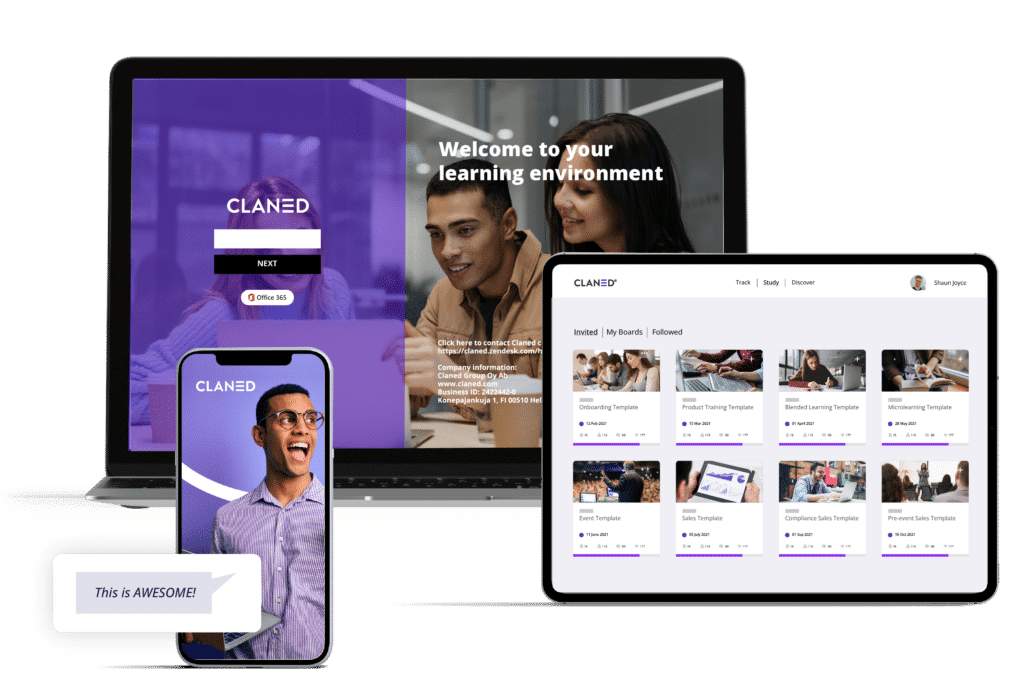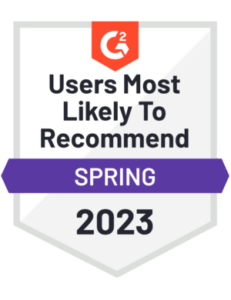Over 47% of learning management systems will be powered by artificial intelligence (AI) in the next three years. The learning process for students might be completely transformed by the application of artificial intelligence in education. A personalized educational experience is possible because of AI.
Personalized learning is an educational technique that concentrates on individual students’ learning processes and caters to their wants, talents, and concerns. Thus, it promises to offer them varied learning experiences to help them acquire knowledge. This method goes beyond earlier education, and people support the view that students could attain better learning when the teaching environment is customized.
This blog discusses the potential of AI in personalized learning, its real-world applications, and the challenges ahead. Continue reading for more information.
The Potential of AI for Personalization
The potential of AI for personalized learning is huge. The global AI in education market will expand from 2022 to 2023 at a CAGR of 36.0%. Therefore, let us see some of the advantages of using AI for tailored learning below:
1. Adaptive Learning
Probably the biggest opportunity that AI offers for personalized learning is its ability to provide learners with adaptive learning opportunities. Platforms based on AI can use these students’ patterns of learning, strengths, and weaknesses to provide customized, appropriate content and exercises. Students who used adaptive learning programs driven by AI saw a 62% increase in test scores.
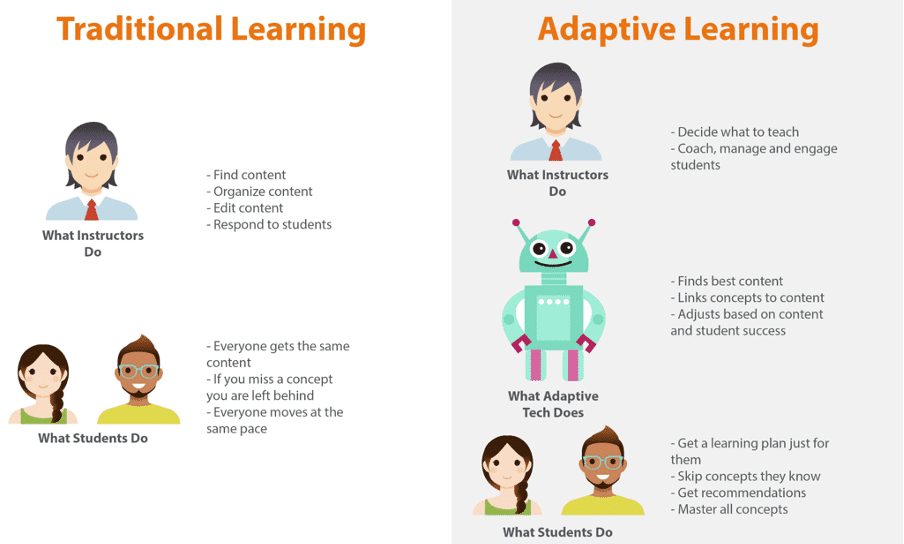
Through the application of suitable speed and complexity in accordance with the student’s level of proficiency, the AI can facilitate an understanding that allows for an individualized instruction process that is optimized to help the student achieve learning goals.
2. Targeted Interventions
AI-powered educational tools allow educators to specifically identify and support students with certain academic difficulties. The evaluation of the student’s success and behavioral data by AI systems allows for detecting the areas where the student might face difficulties. Also, they proactively provide additional support like practice exercises, remedy materials, or one-on-one tutoring.
The fact that this form of support is more directed toward students enhances their ability to gain ground and achieve the required level of skills and knowledge.
3. Cognitive Tutoring Systems
Cognitive tutoring systems driven by AI technology could dramatically change the paradigm by which learners get guided academically. These systems can actually let them virtually talk to their tutor by giving them interactive problem-solving activities and adapting to their responses. They provide one-on-one guidance in real time this way.
Using instructional techniques, cognitive tutoring systems can provide personalized assistance, which leads to in-depth understanding and the building of critical thinking skills.
4. Predictive Analytics
AI can utilize predictive analytics to assess students’ performance and have good reasoning in advance regarding problem areas. AI systems will be able to forecast future academic problems and potential remedial support by looking at previous performance, engagement levels, environmental factors, and many other data points.
Teachers may get insight based on data and stop academic setbacks through targeted support before they happen.
5. Dynamic Content Delivery
AI can assist in crafting educational content that is personalized for each individual student, which can be tailored to a student’s learning progress and personality in real time. AI-enabled learning systems can present content through different formats, e.g., videos, interactive simulations, or text-based materials.
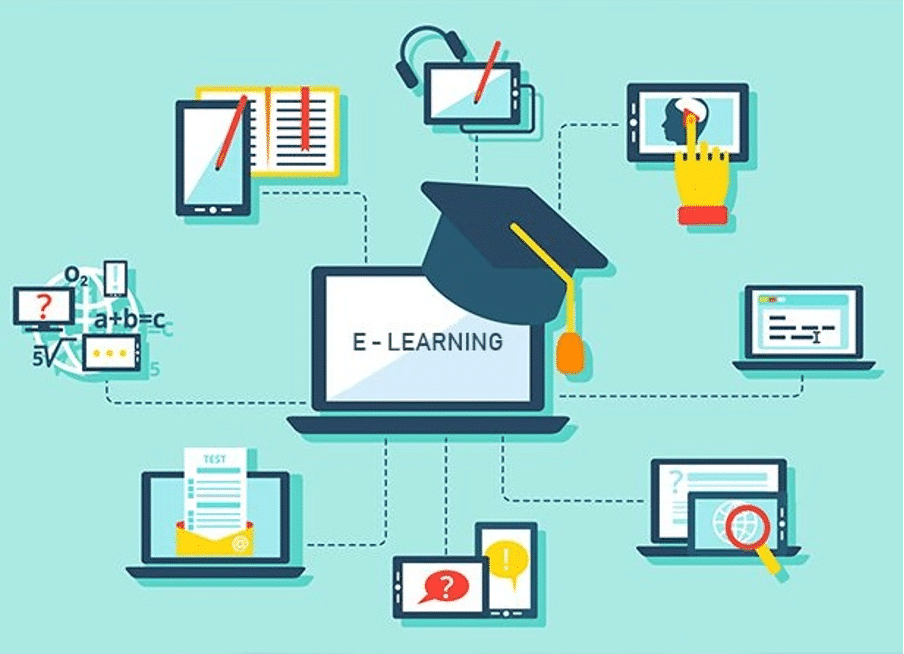
AI also offers the advantage of suggesting supplementary resources and enrichment activities that correspond with the student’s areas of interest as well as their learning curve.
6. Enhanced Accessibility
Education should be accessible to all students equally, and this should not be overlooked. AI can overcome the barriers to education and provide an individualized experience for students who have various types of learning disabilities and needs. AI can give extra aid to students with disabilities by using AI text to speech ability and natural language processing.
By putting education in the form of a dialogue between the system and the student, AI can provide the tools that will help the student learn more easily. Moreover, AI can fulfill everyone’s needs because it can adjust content based on individual accessibility requirements.
Real-World Applications
Many companies and educational institutions have already used AI to bring personalized learning to students. For instance, Knewton and DreamBox have created intelligent learning systems based on AI that offer students adaptive learning experiences.
Knewton
Knewton uses AI technology to make learning more fun and easier. It works like a digital tutor who can figure out which student is good at which part. This feature helps students make their own personalized study plans to get the most out of their education. It offers courses in different subjects and helps students stay focused and motivated.
DreamBox
DreamBox applies AI-based systems by analyzing students’ performance and outlook and then making personalized recommendations for learning materials and activities. These platforms, which always try to meet the educational standards of particular students, are more personalized and effective.
The Future of AI-Powered Personalized Learning
Considering the ever-growing use of AI technology, the future of AI-enabled individualized education opens up a range of possibilities. In the US, almost 60% of K–12 educators have used individualized learning.
AI and Predictive Analysis
In view of the recent developments in the areas of natural language processing, AI services, and predictive analytics, AI technology has the capability to further provide customized and more intelligent learning environments.
AI techniques can automatically identify relevant features or variables within datasets that are most predictive of the outcome. Feature engineering helps improve the accuracy of predictive models by focusing on the most relevant information.
Personalized Feedback
Personalized feedback can be immensely helpful for the success of students. Thus, it is an important factor to consider. AI can be a very useful tool that delivers customized feedback to students, thus allowing them to understand which aspects they are strong in and the issues that need to be addressed. AI-enhanced chatbots provide personalized guidance to students with 91% accuracy.
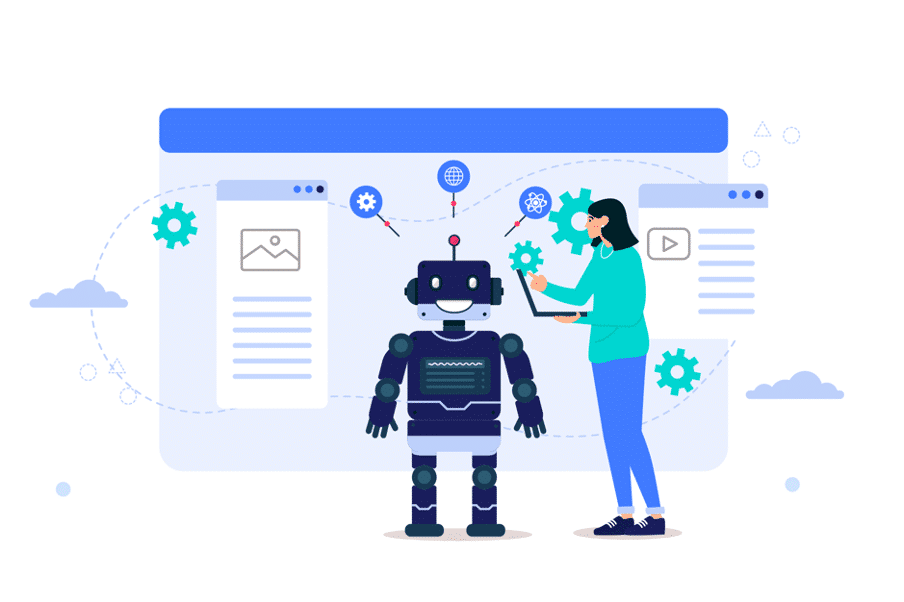
Natural language processing and sentiment analysis, which belong to AI, can assess students’ written comments while giving them tips and relevant feedback on their work. Students can use this individual feedback to identify areas where they erred, make necessary improvements, and reinforce their knowledge of the content.
Personalized Curriculum Design
AI-powered educational tools can help create course curricula targeting students’ interests, goals, and learning purposes. Machine learning techniques are used to identify students’ personal learning preferences and aptitudes, and as a result, AI systems can offer them corresponding learning materials, projects, or experiences that match their ambitions.
AI-powered tools equipped with NLP capabilities can analyze and interpret textual data, such as textbooks and lecture transcripts, to extract key concepts, summarize content, and generate study aids such as flashcards or concept maps. This enhances students’ comprehension and retention of course material.
Customized Learning
AI can also generate customized learning for traditional subject areas and social and emotional learning. It can study students’ indicators, emotional cues, and behavioral patterns.
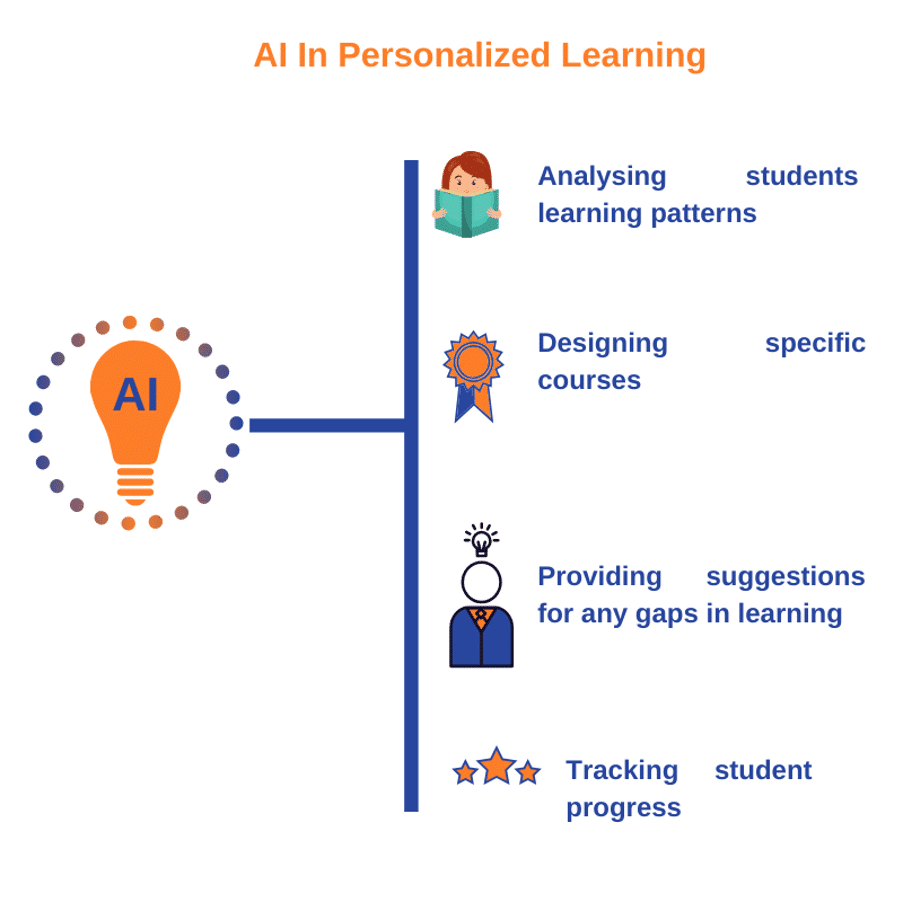
AI also identifies students’ socio-emotional needs, and in this way, educators can foster a more holistic and personalized way of learning. This might have a great impact on how students feel supported and how their mental and overall development is ensured.
Challenges and Considerations
Even though AI has the potential to be beneficial for individualized learning, there are important issues and concerns that must be taken into account. Discussing these concerns is important.
1. Misuse of Personal Information
The moral use of student data in AI-driven customized learning systems is one of the main issues. Because AI needs a lot of data to provide individualized suggestions, there is a chance that personal information will be misused or violated.
The ethical ramifications of gathering and evaluating student data must be carefully considered by educators and legislators, who must also ensure that the correct laws and protections are in place to preserve students’ rights and privacy.
2. Digital Gap
To provide fair access to AI-powered customized learning, it is also necessary to solve the digital gap. Some students may not have computers and internet at the appropriate speed, and the problem may grow if we do nothing to fix it.
It is important to ensure that all students benefit at the same level by providing infrastructure and resources that make it easier for them to use AI tools to personalize their education.
3. Algorithmic Bias
Another difficulty is the possibility of algorithmic bias in AI-driven customized learning systems. Inadequate design and training of AI systems may unintentionally reinforce preexisting prejudices and educational disparities.
To guarantee that AI-powered customized learning is equitable and inclusive for all students, educators and developers must be vigilant about identifying and reducing algorithms.
Conclusion
By giving teachers strong tools to customize instruction to each student’s unique requirements, artificial intelligence has the potential to revolutionize the field of customized learning and bring about new changes in the world of education.
It can improve the efficacy of personalized learning experiences. Those who want to create an efficient online course need to give priority to personalized learning.


